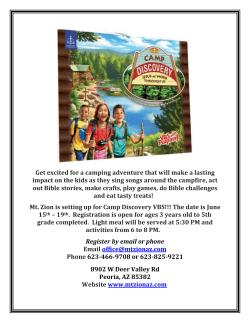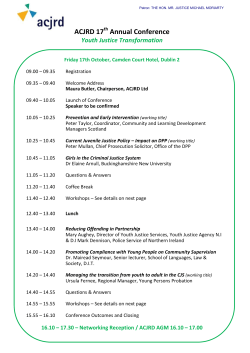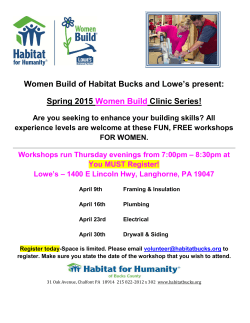
CONN spring 2015.indd
4 Professional Development DVAEYC s The voice of early childhood education &Ice FIRE program, even though we’re not at school. In October, families heard some great songs that their children love, and we had a chance to mention how rhythm and rhyme support early literacy. Children told their parents about how they made the dough and searched for roasting sticks the previous day, and their parents saw how projects and thinking can be extended over time. As teachers crouched over the fire alongside children and families, we modeled how we communicate trust and allow children opportunities for independence and self-regulation, even around a campfire! ICE-MAKING Merryl Gladstone, Director, Community Children’s School Community, Mindfulness, and Inquiry are the three pillars that guide our program at the Children’s Community School, a democratic preschool in West Philadelphia. Through children’s play, we seek to deepen connections, broaden awareness of self, and facilitate critical thinking and exploration. We recognize the power and importance of engaging not just children but also their families in educational experiences. Each child, while a unique individual, is intricately threaded into the life of their family. Our impact on each child’s learning and development is exponentially increased when we engage families in interactive experiences with their children. Here are a few recent opportunities we’ve created for children and families to learn together. THE CAMPFIRE On a Saturday night in October we held our semiannual sing-along campfire. Families and teachers gathered around a fire-pit in Clark Park. The children roasted bannock dough over the fire (bannock bread is a bread cooked on sticks over an open fire!); several people brought guitars and led songs; the adults chatted as children chased and laughed in the cool evening air. A campfire is an opportunity to connect to each other, to our surroundings, and to ourselves -- in other words, to build community. Everyone loves sharing food and music and warmth while surrounded by trees and friends. Our campfire is also a way for families to connect to our educational One morning in December the children went out to the yard and discovered that the previous day’s rain had collected in buckets and containers and then frozen solid overnight! Of course, this led to a day of fascinated investigation (touching the ice, trying to break it, standing on it, bringing it inside and watching it melt, etc.) and curiosity (where did the ice come from? how could we make more? what will happen to it?). We wanted to extend this learning experience, so at the end of the day we suggested to families that they leave a bowl of water outside overnight and let their children investigate what happened. We offered them examples of open-ended questions they might ask their children, such as “What do you think will happen next?” One of the families did us one better: they came to school the next day with the ice they made overnight at home! The whole class’ interest was rekindled, and the children explored the ice with new vigor and asked questions of the child who brought it. By giving families an easy way to participate in this spontaneous project, we weren’t just telling them about how children investigate ideas over time, we were showing them and inviting them to join us in the inquiry. ALL-AGES WORKSHOPS We consistently hear from our families that they learn more about parenting and good educational practices when they have hands-on support in learning and playing with their kids. This spring we’ve created several workshops for families and children together. Teacher Martha is the founder of StoryUp [https://storyupphilly.wordpress.com], an organization that creates interactive storytelling workshops for all ages of children and their parents. On a Saturday morning in January she invited children and their families to come to school and work together on storytelling projects. Martha led everyone through the process of creating and sharing stories around children’s ideas, guiding parents and children in active play and story-building. While the children played, she also shared tips with families on ways to create similar experiences at home, and described how this kind of play supports not only literacy but also critical thinking, cooperation, and self-regulation. In March Teacher Jarrod will offer a similar wholefamily workshop on rough-housing. All-ages workshops create pathways for families to connect in new ways with both the school and their children, as they participate actively in their children’s learning experiences and receive support in trying out new approaches. The campfire, the ice-making, and the workshops are just a few ways that we invite families to interactively connect with their children, the classroom curriculum, and our school. Families aren’t just seeing what their children learn at school, they’re participating in it; they’re not just getting tips from us, they’re seeing us practice what we preach. We know that it’s not just kids who learn best by playing and doing -- grownups do too! Join us For A New Study Group on PLAY! ................................. Expand your investigation of the critical importance of play in the daily lives of children by becoming a member of DVAEYC’s new study group: Play = Learning: Supporting Children’s Right to Play Daily. Educators and advocates will gather monthly throughout the region to discuss issues and ideas related to ensuring young children have varied play experiences in early childhood program settings. Generally, meetings are held in the early evening and light refreshments are served. Typical gatherings have between 20 and 40 professionals who want to network, share ideas and strategies, collaborate, and visit one another’s programs. First gathering will be in April. Many thanks to PNC Grow Up Great for sponsoring the DVAEYC study group on play! To sign up or for more information email Peg Szczurek, peg@dvaeyc.org
© Copyright 2025









